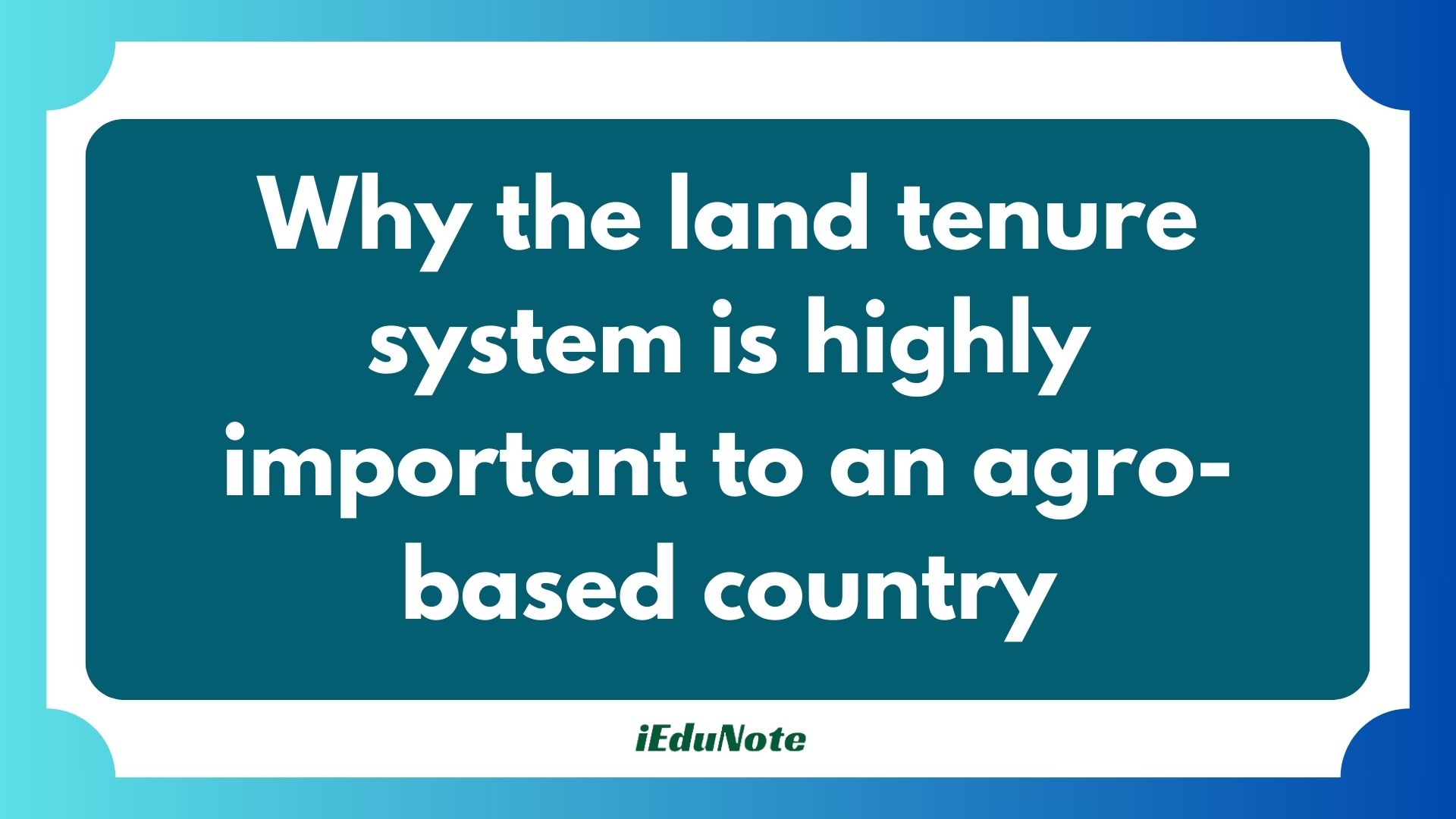The laws and traditions regarding land use and land ownership are termed land tenure, the cultivating right of land, the relationship between the real owner and land user, and the relationship between the landowner and the state. The determination of land rent and the method of rent recovery are controlled by the land tenure system.
Importance of land tenure system
The land tenure system controls the trends of agricultural development. The base of agricultural development is the traditional land tenure system of a country.
The proper and dynamic land tenure system enhances agricultural development. A defective land tenure system becomes a barrier to agricultural development.
Why the land tenure system is highly important to an agro-based country

Agricultural development
Agricultural development depends on the permanent right or ownership of land. If farmers have the right to land, production will be enhanced. On the other hand, if there is no right of farmers on land, then encouragement for increasing production and agricultural development will be hampered.
Decreasing landless farmers
Through the land tenure system, if land ownership is concentrated in the hands of a few persons, then the number of landless farmers increases.
If these landless farmers work as day laborers or sharecroppers, agricultural development will be hampered because the absence of permanent ownership discourages them from increasing productivity.
Equitable distribution of wealth
A defective land tenure system can lead to land ownership being centered in the hands of a few landlords or rich farmers. In contrast, many small, marginal farmers, or landless farmers will be created. Thus, unequal distribution of wealth will occur. The equitable distribution of wealth depends on a proper land tenure system.
Creating economic holdings
Excessive subdivision and fragmentation of holdings hinder agricultural development. Through a proper land tenure system, small holdings can be consolidated into economic holdings.
Social impact
Land ownership and the amount of land controlled determine social status. Landlords and landowners enjoy social status, while landless farmers do not.
Political importance
Land tenure has political significance as the amount of land ownership through the land tenure system determines the degree of political power. During the Middle Ages, landlords enjoyed all political rights.
Production efficiency
Agricultural production efficiency largely depends on the traditional land tenure system. If the land tenure system is in favor of public interest, production and production efficiency increase.
Law and order situation
A defective land tenure system can lead to a breakdown of law and order in society, resulting in unrest and frequent occurrences of murder cases.
Optimum use of land
The optimum use of land in a country depends on the land tenure system. A production-oriented land tenure system allows for proper land utilization, while a defective system leads to land wastage and misuse.
Economic development
The rapid economic development of a developing country largely depends on a proper land tenure system. Efficient land tenure systems lead to increased agricultural production and investment in the industrial sector, fostering economic development.
Sharecropping system

If a real farmer takes land from its real owner and cultivates it for a share of the crop for the sake of investment of labor and capital, and a particular portion of the produced crop is given to the original owner, then this system is termed as sharecropping. in different country, approximately 43% of the land is cultivated under the sharecropping system.
Types of sharecropping
There are 3 types of sharecropping systems in Bangladesh.
Firstly, the landowner does not pay any input costs of cultivation like seed, fertilizer, insecticides, etc. In this case, the ratio of the crop divided between the owner and the sharecropper is 50%.
Secondly, the landowner bears the cost of inputs, and in that case, he gets 2/3 of the output, and the sharecropper gets the remaining 1/3 of the produced crop.
Thirdly, in some cases, the sharecropper or land user has to pay some money crop, or both, to the landowner for land use under a contract. In that case, the land user has to fulfill the condition, although it may be that no crop is produced.
Advantages of sharecropping
- Successful in cropping: Sharecropping ensures that no land is left fallow, utilizing all cultivable areas.
- Surplus income: Marginal farmers can earn surplus income through sharecropping.
- Cultivating the land of absent owners: Small businessmen or urban dwellers can earn extra income by cultivating their small land in rural areas through sharecropping.
- Reducing disguised unemployment: Households with surplus labor can be employed in sharecropping farming.
- Increasing employment: Sharecropping creates employment opportunities for marginal farmers who may otherwise remain unemployed due to limited alternative work in rural areas.
- Commercial farming: Sharecropping can facilitate commercial farming in areas with small landholdings.
- Best utilization of inputs: Some farmer families have all agricultural inputs, including labor, but no land. Through sharecropping, they can efficiently utilize these inputs and increase production.
Disadvantages of sharecropping
- Lacking interest in production: Sharecroppers may lack the motivation to increase production because they have to give a significant portion of their crops to the landowner.
- Reduces production: Sharecroppers do not have legal ownership of the land, leading to frequent changes in land tenure, which discourages them from increasing productivity.
- Problem of credit: Credit institutions do not provide loans for sharecropped land, limiting the ability to invest capital in cultivation.
- The problem of productivity: Sharecroppers may not invest in improving land productivity because the landowner does not share the additional cultivation cost proportionally.
- The problem of formulating plans: Sharecroppers face uncertainty in land tenure, making long-term development planning difficult.
- Lack of freedom: Sharecroppers cannot cultivate freely without the landowner’s approval, limiting their ability to experiment with different crops or techniques.
- Reduces social status: Sharecropping can negatively impact social status, leading to mental tension for sharecroppers.
- Lack of land development: Sharecroppers lack permanent rights to cultivate the land, which may discourage efforts to improve land productivity.
Should the sharecropping system be abolished?
There are some advantages simultaneously some disadvantages are present there. So at present, some think that sharecropping should be abolished in countries.
Considering present socio-economic conditions some problems may arise if the sharecropping system is abolished. These are as follows
- Reduction of production: The total agriculture production of the country may be reduced.
- Fallow land: Big land lords may lead the land fallow.
- Increase of unemployment: If share cropping system is abolished the share cropper farmers may be unemployed.
- Capitalist production may be introduced: The sharecropping system should not be completely abolished. If sharecropping is suddenly, abolished then including the deduction of total production, so many problems may arise.
Considering real situations, in the 1984 land reform program some steps have been prescribed in favor of the interest of the sharecroppers. - So share cropping should not be completely abolished rather their interest should be preserved.
Policy Recommendations

Improving rural tenure security
A key factor behind growing poverty is the increasingly insecure relationship between people and the land. Land is the most important resource in rural and agricultural country. Without
owning or having access to land, people cannot sustain themselves.
Over the past 30 years, the dispossession of small peasant producers from their land has increased dramatically.
Today at least 60 percent of rural families are landless. These people are turned into seasonal laborers, working or sharecropping on land belonging to others.
So, the government should formulate and implement an economically viable land reform policy to ensure that the farmers feel an emotional attachment to the land they cultivate.
Enforcing land reform and agricultural development polices
Bangladesh’s future lies in its enormous agricultural potential. But without ensuring the land ownership and tenure structure, there is a little hope for development; moreover, there will be a continuing migration of rural people urban.
If an appropriate mix of land reform and agricultural development policies were adopted, Bangladesh could meet its food needs as well as ensure rural employment in agriculture since this sector still accounts for 52% of the overall employment.
In addition to agricultural development, there is a need to create many more sources of non-farm incomes for rural people. This will also require substantial policy change aimed to encourage the production of goods for local consumption.
Restrict informal settlements of agricultural land
To ensure tenure security informant settlements be integrated into formal land market and thereby prevent changes in land values which could produce distortions in land markets and displace large number of poorest social groups who rent in informal settlements.
Austerity in acquisition of land
Without proper land security and property rights, a large amount of alluvial lands are acquired in the name of development projects that in many instances turnout to be useless. The unplanned use and misuse of acquired land is also common.
Proper land title would ensure in protecting the fanners’ fertile land from being acquired. Moreover, minimum requirement of land should determine with austerity before implementing any development project
Ensuring good governance in tenure system and property rights
Property rights reforms particularly those aiming to strengthening the marketability of land rights may not attain the goals given the imperfect nature of rural credit markets. The traditional land system in Bangladesh offers much security and certainty provided that the traditional landholders
have legal authority over their land. The policy implication is that the government should strengthen the traditional landholding institutions by supporting and empowering them rather replacing them. This is an issue of good governance and much depends upon the political will of the government.
Conclusion
The research study done on effect of land tenure and property rights on agricultural productivity in Ethiopia, Namibia and Bangladesh indicates the fact that proper land ownership policy is vital in order for vast majority of population living in rural areas whose income is dependent on farming.
The problem faced commonly by the farming population, who are in large extent small scale farmers, is the increasing rate of poverty caused by maladministration of land ownership.
Due to this insecure property rights the farm households do not feel emotional attachment to the land that inhibit the land productivity and
environmental sustainability as well.
Despite the fact mentioned above the three countries differ from each other due to history, state administration policy and land ownership system followed in each country respectively.
It is imperative that land administration departments of these countries should ensure good governance and transparency in ensuring proper land tenure and property rights.

